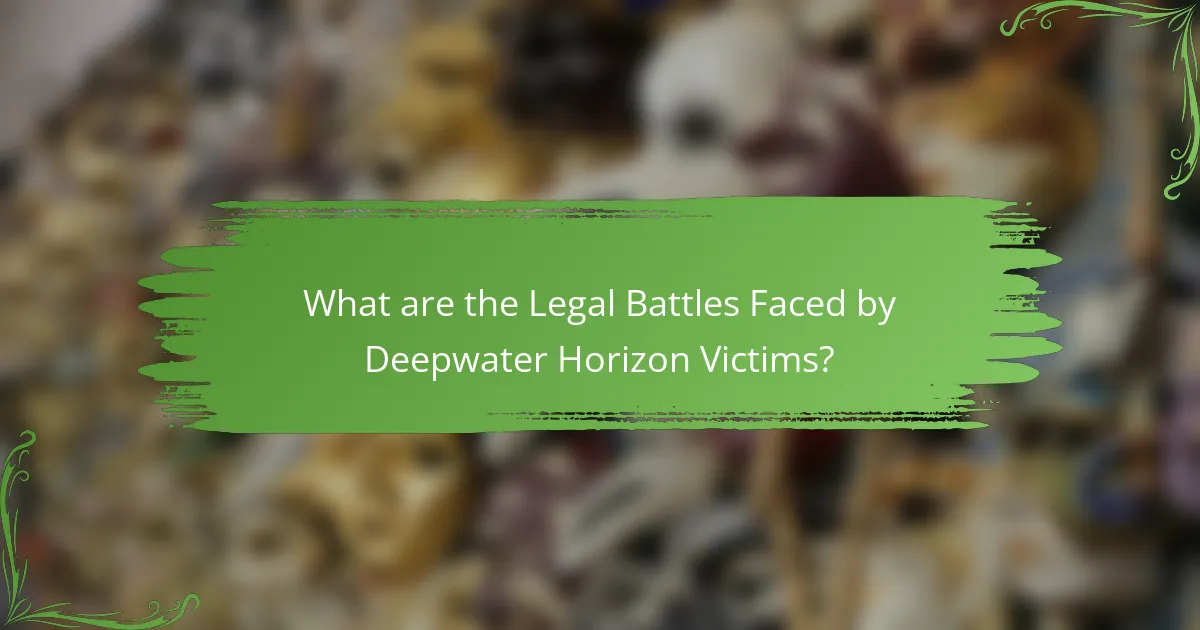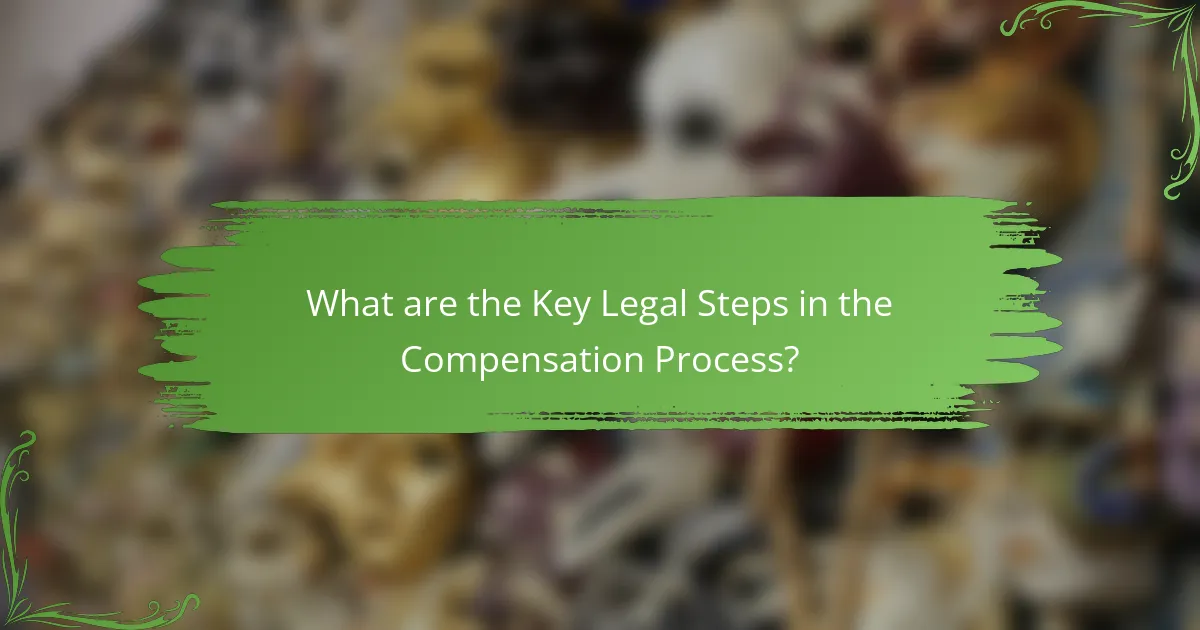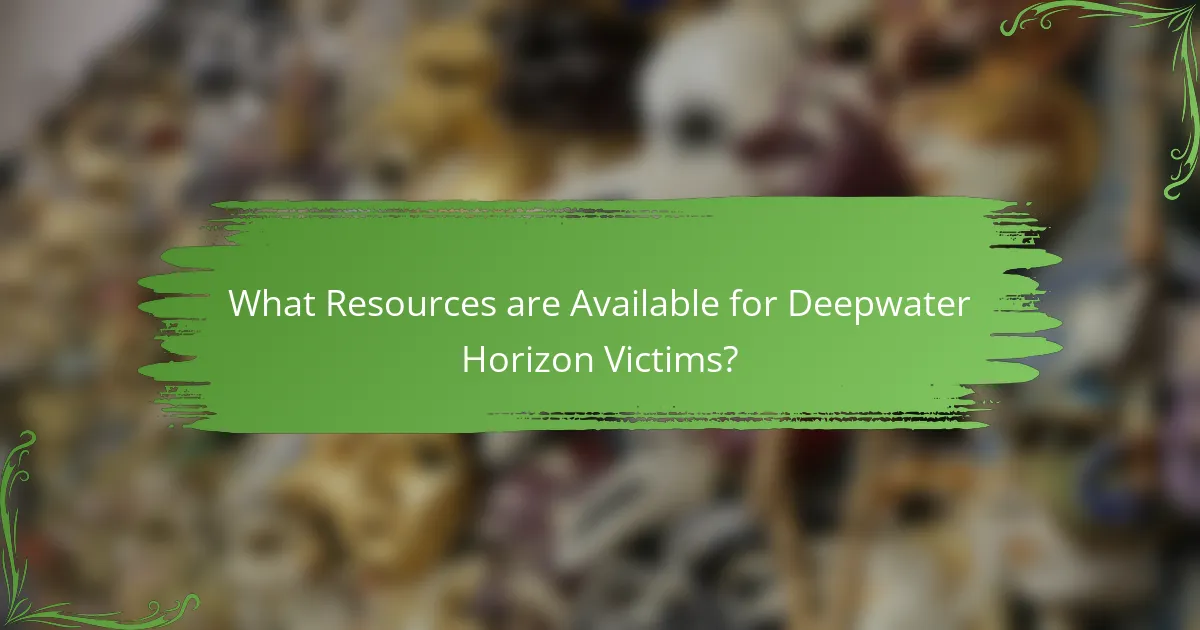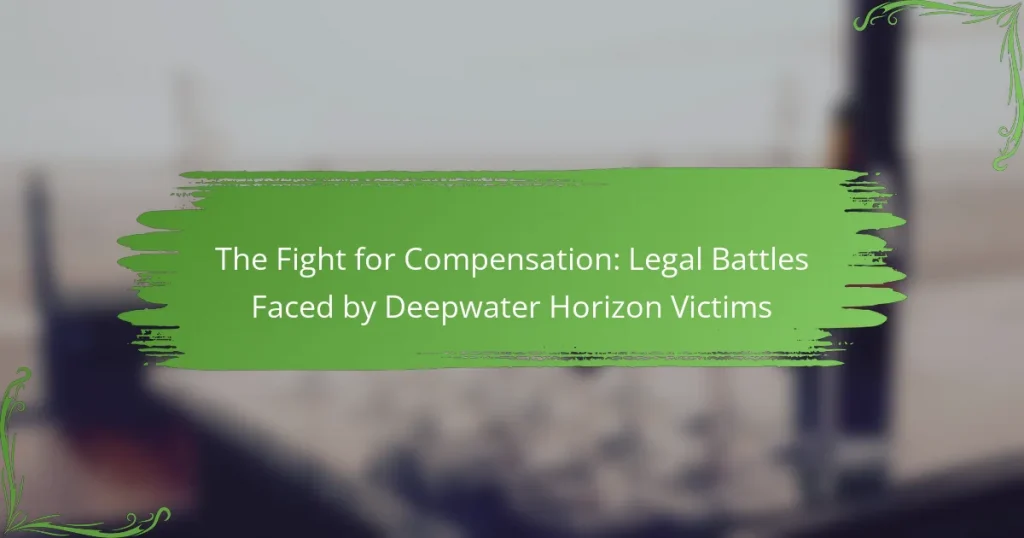Deepwater Horizon victims are engaged in extensive legal battles to secure compensation for damages resulting from the oil spill. These legal challenges involve claims against BP and other parties deemed responsible, often requiring victims to navigate complex litigation processes governed by federal and state laws. Key steps in the compensation process include filing claims, gathering supporting evidence, and attending hearings where adjudicators assess the validity of claims. Various resources, such as the Gulf Coast Claims Facility and BP Settlement, provide financial assistance and support for victims, while legal aid organizations help navigate the claims process. The article outlines the challenges faced by these victims and the resources available to aid in their recovery efforts.

What are the Legal Battles Faced by Deepwater Horizon Victims?
Deepwater Horizon victims face numerous legal battles seeking compensation for damages. These battles include claims against BP and other responsible parties. Victims often contend with complex litigation processes. They must navigate federal and state laws regarding environmental damage and economic loss. Many victims join class-action lawsuits to strengthen their claims. The legal process can be lengthy and costly, causing additional stress. Settlement negotiations frequently occur, but not all victims receive fair compensation. Some cases proceed to trial, further prolonging resolution.
How did the Deepwater Horizon disaster impact victims legally?
The Deepwater Horizon disaster legally impacted victims through extensive litigation for compensation. Victims, including fishermen and coastal residents, sought damages for economic losses and environmental harm. The disaster led to the creation of the Deepwater Horizon Medical Benefits Class Action Settlement. This settlement provided medical monitoring and compensation for health issues related to the spill. Legal claims were filed against BP and other responsible parties, resulting in billions of dollars in settlements. In 2015, BP agreed to a $20.8 billion settlement to resolve claims from federal and state governments. This settlement aimed to address both economic and environmental damages caused by the spill. Victims faced challenges in proving their claims and the extent of their losses, leading to a complex legal battle. Overall, the disaster significantly shaped the legal landscape for maritime and environmental law.
What types of claims have been filed by victims?
Victims of the Deepwater Horizon disaster have filed several types of claims. These include personal injury claims, property damage claims, and economic loss claims. Personal injury claims relate to physical harm suffered due to the disaster. Property damage claims address damages to homes and businesses caused by the oil spill. Economic loss claims involve financial losses incurred by individuals and businesses due to the spill’s impact on the local economy. According to the Gulf Coast Claims Facility, over 200,000 claims were filed in the aftermath of the disaster, highlighting the extensive impact on victims.
What legal frameworks are involved in these claims?
The legal frameworks involved in claims by Deepwater Horizon victims include federal and state laws. The Oil Pollution Act of 1990 establishes liability for oil spills and compensation for damages. The Clean Water Act regulates discharges of pollutants into U.S. waters. Additionally, the Jones Act allows maritime workers to seek compensation for injuries. These laws collectively provide avenues for victims to pursue claims against responsible parties. The 2012 settlement agreement between BP and affected individuals also plays a crucial role in the claims process. This agreement outlines compensation mechanisms for economic and environmental damages.
Why is compensation important for Deepwater Horizon victims?
Compensation is crucial for Deepwater Horizon victims to address the extensive damages they suffered. The 2010 oil spill caused significant economic and emotional harm to individuals and communities. Victims faced loss of income, property damage, and health issues linked to the disaster. Financial compensation helps restore livelihoods and supports recovery efforts. According to reports, claims processes and legal battles have been necessary for victims to obtain justice. Many victims have struggled for years to secure adequate compensation for their losses. Thus, compensation plays a vital role in their healing and rebuilding process.
What are the main challenges victims face in obtaining compensation?
Victims of the Deepwater Horizon disaster face several challenges in obtaining compensation. One major challenge is the complex legal process involved in filing claims. Many victims lack the legal knowledge required to navigate this system effectively. Additionally, the claims process can be lengthy and bureaucratic, causing delays in receiving funds.
Another significant challenge is proving the extent of damages. Victims must provide substantial evidence to demonstrate the impact of the disaster on their lives. This requirement can be overwhelming for those already dealing with trauma. Furthermore, some victims may encounter resistance from insurance companies or the responsible parties, complicating their pursuit of compensation.
The emotional toll of the situation can also hinder victims’ ability to advocate for themselves. Many may feel discouraged by the obstacles they face. According to a report by the U.S. Government Accountability Office, only a fraction of claims were fully compensated, highlighting the systemic issues within the compensation framework.
How does compensation affect the recovery of victims?
Compensation significantly affects the recovery of victims. It provides financial support for medical expenses and lost wages. This financial relief can reduce stress and anxiety associated with recovery. Victims often experience improved mental health when they receive compensation. Studies indicate that timely compensation correlates with quicker recovery times. For instance, a report by the National Institute of Justice highlights that financial assistance can lead to better psychological outcomes for victims. Overall, compensation plays a crucial role in facilitating both physical and emotional recovery.

What are the Key Legal Steps in the Compensation Process?
The key legal steps in the compensation process include filing a claim, gathering evidence, and attending hearings. First, victims must submit a formal claim to the appropriate compensation fund. This initiates the process for seeking financial restitution. Next, claimants must compile evidence to support their claims. This evidence can include medical records, financial documents, and witness statements. After evidence is submitted, hearings may be scheduled to evaluate the claims. During these hearings, claimants present their cases before adjudicators. The adjudicators then determine the validity of the claims and the amount of compensation owed. Finally, the compensation is disbursed to eligible claimants based on the adjudicators’ decisions. These steps are critical in ensuring that victims receive the compensation they deserve.
How do victims initiate legal action for compensation?
Victims initiate legal action for compensation by filing a lawsuit in court. They must gather evidence of their damages, such as medical records and financial losses. Next, they should consult with an attorney experienced in environmental or personal injury law. The attorney will help them prepare and file the necessary legal documents. Victims may also need to participate in pre-trial procedures, such as depositions and discovery. This process ensures that all relevant information is disclosed to both parties. Once the case is filed, it may go to trial or be settled out of court. Legal action can be complex, requiring adherence to specific deadlines and regulations.
What documentation is required to support claims?
Victims of the Deepwater Horizon disaster must provide specific documentation to support their claims. Required documents typically include proof of employment, such as pay stubs or tax returns. Medical records demonstrating health impacts from the disaster are also essential. Additionally, victims should submit photographs or videos showing damage to property or environment. Witness statements can further validate claims of loss or injury. Legal documents, including filed lawsuits or settlement agreements, may also be necessary. These documents collectively substantiate the claims made by victims seeking compensation.
How do victims choose the right legal representation?
Victims choose the right legal representation by evaluating attorneys based on experience, specialization, and success rates. They often seek lawyers with a proven track record in similar cases. Victims should also consider the attorney’s communication style and willingness to understand their unique situation. Referrals from trusted sources can provide valuable insights into potential representation. Additionally, assessing the attorney’s resources and support staff is crucial for effective case management. Research shows that victims who choose specialized attorneys often achieve better compensation outcomes.
What role does litigation play in the compensation process?
Litigation plays a critical role in the compensation process for Deepwater Horizon victims. It serves as a means for victims to seek justice and financial reparations. Through litigation, victims can hold responsible parties accountable for damages. Legal proceedings can establish liability and determine the extent of harm caused. Additionally, litigation enables victims to negotiate settlements or receive court-awarded compensation. The process often involves complex legal frameworks and can take years to resolve. Statistics show that many victims rely on litigation to secure fair compensation for their losses. For instance, the settlement fund established for Deepwater Horizon claims processed thousands of claims through litigation channels.
What are the stages of a legal battle for compensation?
The stages of a legal battle for compensation typically include several key phases. Initially, the plaintiff files a complaint outlining the claim. Next, the defendant responds to the complaint, which may include counterclaims. Discovery follows, where both parties exchange evidence and information. This phase often involves depositions and document requests. After discovery, pre-trial motions may be filed to resolve issues before trial. If the case proceeds, a trial occurs where both sides present their arguments. Finally, a verdict is reached, and if necessary, appeals may follow. Each stage is crucial in determining the outcome of the compensation claim.
How can mediation or settlement affect outcomes?
Mediation or settlement can significantly affect outcomes in legal battles. These processes often lead to quicker resolutions compared to traditional litigation. Settlements can provide immediate financial relief to victims, which is crucial for those facing ongoing hardships. Mediation allows parties to negotiate terms that may better suit their needs than a court ruling.
In the context of the Deepwater Horizon victims, settlements have enabled many to receive compensation more swiftly. For instance, the Deepwater Horizon claims process involved mediation efforts that resulted in billions of dollars in settlements. This approach reduced the uncertainty and duration of legal proceedings, which can be lengthy and costly.
Overall, mediation and settlement can lead to more favorable outcomes by providing timely resolutions and tailored agreements for all involved parties.

What Resources are Available for Deepwater Horizon Victims?
Deepwater Horizon victims can access various resources for support and compensation. The Gulf Coast Claims Facility (GCCF) provides financial assistance for economic and property damage. The BP Settlement offers payments to individuals and businesses affected by the spill. Legal aid organizations assist victims in navigating claims and lawsuits. Non-profit groups provide emotional support and recovery resources. Additionally, the National Pollution Funds Center administers the Oil Spill Liability Trust Fund for further compensation. These resources aim to aid victims in their recovery and ensure they receive due compensation for their losses.
How can victims access legal aid and support services?
Victims can access legal aid and support services through various organizations and resources. Legal aid organizations provide free or low-cost legal assistance. Many states have legal aid hotlines that victims can call for guidance. Additionally, non-profit organizations often offer support services tailored to specific needs. Victims can also seek assistance from local bar associations for referrals to attorneys. The American Bar Association provides resources for finding legal help. Furthermore, victims may qualify for compensation funds established for specific disasters, such as the Deepwater Horizon oil spill. These funds often have application processes that include legal assistance for claim submissions.
What organizations provide assistance to Deepwater Horizon victims?
Organizations that provide assistance to Deepwater Horizon victims include the Gulf Coast Claims Facility (GCCF) and the Deepwater Horizon Disaster Fund. The GCCF was established to process claims from individuals and businesses affected by the oil spill. It distributed over $6 billion in compensation. The Deepwater Horizon Disaster Fund supports recovery efforts and provides financial assistance. Additionally, various non-profit organizations, such as the Louisiana Bucket Brigade, offer resources and support to affected communities. These organizations aim to aid recovery and provide financial relief to victims impacted by the disaster.
How can victims stay informed about their rights and options?
Victims can stay informed about their rights and options by accessing legal resources and advocacy groups. Organizations such as the Gulf Coast Claims Facility provide information on compensation processes. Legal aid services often offer guidance on navigating claims. Victims can also attend community meetings to learn about their rights. Online resources, including government websites, outline available options. Staying connected with local support networks helps victims share experiences and knowledge. Regularly reviewing updates from relevant legal entities ensures awareness of changes in laws or procedures. Engaging with attorneys specializing in environmental disaster claims offers tailored advice and support.
What practical tips can help victims navigate the compensation process?
Victims navigating the compensation process should gather all relevant documentation. This includes medical records, employment history, and incident reports. They should also keep detailed records of expenses related to the incident. Maintaining a timeline of events can clarify the sequence of occurrences.
Consulting with an attorney experienced in compensation claims is advisable. Legal experts can provide guidance on filing procedures and deadlines. Victims should be aware of the specific eligibility criteria for compensation. Understanding the claims process can help in preparing necessary paperwork.
Regular follow-ups with the compensation board can ensure progress is monitored. Being persistent and proactive can lead to faster resolutions. Additionally, joining support groups may provide emotional support and shared experiences.
The main entity of this article is the Deepwater Horizon disaster and its legal ramifications for victims seeking compensation. The article outlines the complex legal battles faced by victims, including various types of claims such as personal injury, property damage, and economic loss. It discusses the legal frameworks involved, the importance of compensation for recovery, and the challenges victims encounter in the claims process. Additionally, it highlights the key legal steps in filing claims, the role of litigation, and available resources for victims to navigate their legal options effectively.


